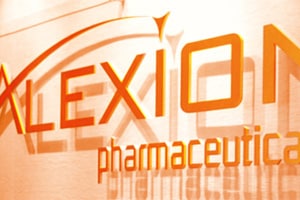 Alexion Pharma’s drive to reduce its reliance on cash cow Soliris has gone up a gear with a $855m offer for rare disease company Wilson Therapeutics.
Alexion Pharma’s drive to reduce its reliance on cash cow Soliris has gone up a gear with a $855m offer for rare disease company Wilson Therapeutics.
Sweden-based Wilson’s lead product is WTX101, currently in phase III development for the genetic disorder Wilson’s disease, which leads to build up of copper in vital organs and – in turn – severe liver damage as well as neurological symptoms such as impaired movement, speech, swallowing, and psychiatric disorders.
WTX101 is an orally-active copper binder that can address the build-up in blood and the liver, and has a novel mechanism of action that Wilson says differentiates it from other metal chelator drugs, which can be associated with serious side effects and are ineffective in almost half of all patients. The drug has been awarded fast-track status in the US after a positive phase II trial, and is classed as an orphan drug in both the US and EU.
Ludwig Hantson, Alexion’s chief executive, said: “The acquisition of Wilson Therapeutics is a strong strategic fit for Alexion given the overlap with our current clinical and commercial focus on metabolic and neurologic disorders, and is an important first step in rebuilding our clinical pipeline.”
Alexion put to rest some of the anxiety about its ability to diversify beyond paroxysmal nocturnal haemoglobinuria (PNH) treatment Soliris (eculizumab) when it reported phase III data for follow-up ALXN1210, a second-generation PNH therapy with less frequent dosing, setting up regulatory filings later this year. The drug matched Soliris for efficacy with a trend towards superiority.
Meanwhile, it’s also been trying flesh out its product line through acquisitions, with varied success. A $1bn purchase of Enobia in 2011 gave it an enzyme therapy for the ultra-orphan disease hypophosphatasia (HPP) – Strensiq (asfotase alfa) – which made $340m in sales last year but still has a long way to go before it bears comparison with Soliris’ $3.1bn turnover.
However, its 2015 takeover of Synageva for $8.4bn has been less successful, with Kanuma (sebelipase alfa) for lysosomal acid lipase deficiency (LAL-D) so far failing to deliver its expected sales performance, making just $55m in 2017, while pipeline candidate SBC-103 for mucopolysaccharidosis (MPS) IIIB failed in trials last year.
The underperformance led Alexion into a restructuring drive last year to reduce headcount by 20% and close facilities in order to free up cash for R&D projects. Since then it has added to its patents for Soliris and is claiming protection from generic competition out to 2027, although that could of course be challenged in the courts.
Analysts have suggested sales of WTX101 will likely reach around $250m at peak, so Alexion will likely need to think about additional bolt-on deals before it can be confident about preparing for a post-Soliris future.




